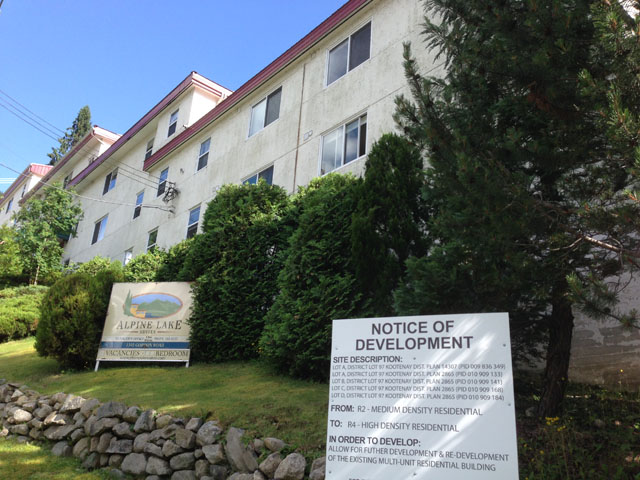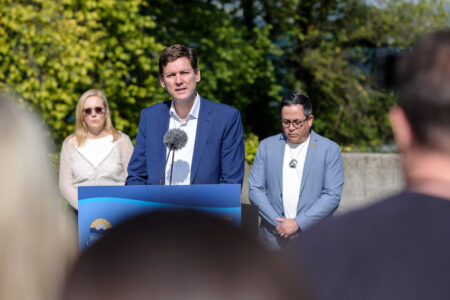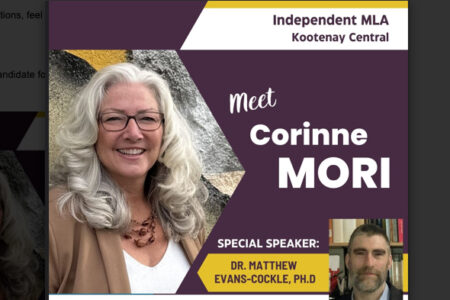Former Notre Dame University student housing apartments caught in legislative limbo
A zoning snafu at the former Notre Dame University student housing apartments has the old building’s owner’s plans to renovate caught in a legislative limbo.
The Alpine Lakes Suites have been deemed non-conforming within density requirements for its R2 zone since 2013 when city council adopted a new zoning bylaw.
With 49 units currently in Alpine Lake Suites, under the R2 zoning in which the building resides it is permitted to only have 26 units.
This anomaly only matters when structural alterations or additions are proposed: Those changes cannot be made to a building while it is non-conforming.
The Suites owner would like to upgrade and renovate the building, but can’t because the building does not conform to the density (use) requirements of the R2 zone.
Although the public process to achieve a zoning amendment to R4 has begun amid some neighbourhood concern, council has tabled a decision — its next regular meeting is July 6 — with a final public hearing to be scheduled in its wake after two readings of the zoning amendment.
City staff, along with the property owner, conducted a public open house on May 4 in which 12 neighbourhood residents attended. Increased residential density was a concern raised, as were issues of traffic, parking and building height.
In addition, the city has received seven letters from residents, citing increased density and impacts on the neighbourhood such parking, compliance with street parking restrictions, emergency access on Ninth St. and traffic (existing and anticipated).
But the existing apartment building is consistent with the city’s sustainability principle for Healthy Neighbourhoods, said senior city planner Megan Squires in her June 1 report to council, as it provides diverse and affordable housing opportunities for residents.
The Fairview neighbourhood objectives outlined in the Official Community Plan specify a desire “to achieve a geographical distribution and mix of housing types, densities, and tenures throughout the city of Nelson in order to provide the community with a variety of housing choices and lifestyle options.”
The OCP also recommends housing options that are appealing, attainable and affordable to all people, of all ages, abilities and income levels.
Squires said Alpine Lake Suites supports these objectives by providing bachelor, one-, two- and three-bedroom suites at affordable rents (from $500 to $1,200, depending on the unit size and location, as well as the social circumstance of the renter).
The housing options available at Alpine Lake Suites qualify as market rental. The rental prices are below market for all unit types, which makes them more affordable for youth, seniors, and families — key populations identified in the strategy who experience difficulties in finding affordable housing in Nelson.
The city’s Advisory Planning Commission reviewed the application on April 15. They recommended approval of the proposed amendment if the city’s development services staff amend R4 zoning wording to ensure that any future development on the site complied with the established zoning regulations.
The current problem for the Suites is not new. Alpine Lakes Suites has been lodged in a gray area and has not conformed to zoning for over 30 years. It did not conform with the density or setback regulations in the old R4 zone, and it does not conform with the density, height, or setback requirements in the new R2 zone.
The owners have indicated they would like the building to conform with zoning so they can proceed with renovations, upgrades and maintenance.
City staff are recommending a covenant that ensures that should the building be damaged or destroyed to the extent of 75 per cent or more of its value above its foundations — as determined by the building inspector — that it must be repaired or reconstructed in accordance with the R2 zone regulations in the bylaw.
“Staff support this change, as it will ensure that the owners are able to maintain the building in good repair so that it continues to provide housing to residents in our community,” said Squires in her report to council.
From Marianne to Alpine
The building (called Alpine Lake Suites) was constructed as student housing by Notre Dame University.
When Notre Dame University was dissolved the assets and obligations were assumed by the Province of B.C. The building (known at the time as the Marianne Apartments) was sold to a private interest in 1982.
Between 1984 and 2013 the property was zoned R4. When the new zoning bylaw was adopted by council in 2013, the property was rezoned R2. This change was applied to many properties throughout the city.
But the building does not comply with the current R2 zoning nor with R4 zone either. It is a non-conforming building, on the basis of required density, setbacks and height.
Cities fit for children
The city is pursuing the hosting of the 2019 Cities Fit for Children Summit.
Carrying over a desire from previous council, city council will embark on a fact-finding mission to see what is involved in hosting the event — slated for this November in Vernon — in preparation of a 2019 bid.
Originally council was planning to host the 2017 summit — the summit is held every two years — but the concern for the amount of work heaped on city staff to plan the event was deemed too much, said Coun. Janice Morrison.
She requested some councilors and city staff attend the upcoming summit in November in Vernon to see what was involved in hosting.
“I think we need to be making sure our own house is in order … because we have a lot of projects on the go … and I think we are going to be adding more to staff’s plate and it’s asking a bit too much at this time,” she said.
A report to council on the staff and budget implications of hosting the event will be made prior to applying to host the summit.
Economic benefits to the community are expected as the event hosts approximately 300 delegates, but there will be administration staff and finance resource impacts to the city.
Cities Fit for Children Summit is intended to run as a “break even” event with costs covered by the combination of registration fees and donations from sponsors.
The host municipality and local committee representatives contribute their time and resources on an ‘in-kind’ basis as they work to bring the event together.

























